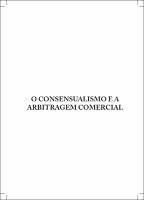| Compartilhamento |


|
Use este identificador para citar ou linkar para este item:
https://deposita.ibict.br/handle/deposita/84Registro completo de metadados
| Campo DC | Valor | Idioma |
|---|---|---|
| dc.contributor.author | Sirotsky Scaletscky, Fernanda | - |
| dc.date.accessioned | 2019-10-22T14:22:01Z | - |
| dc.date.issued | 2019 | por |
| dc.identifier.isbn | 978-65-5016-023-4 | por |
| dc.identifier.uri | https://deposita.ibict.br/handle/deposita/84 | - |
| dc.description.resumo | Sendo cada vez mais presente a arbitragem comercial como uma forma adequada de resolução de disputas empresariais, consequência natural é o surgimento de cases, cada vez mais complexos, que são postos para resolução por árbitros, juízes e advogados. Nesse sentido, a presente obra apresenta e busca resolver alguns desses problemas atuais da arbitragem comercial nacional e internacional, tais como a visão da cláusula compromissória enquanto negócio jurídico, os requisitos formais aplicáveis à convenção arbitral e as críticas daí advindas, bem como outras formas (que não as clássicas) de se demonstrar o consentimento das partes à arbitragem. A obra também analisa o silêncio enquanto manifestação de vontade, a teoria do grupo de sociedades e tece uma crítica sobre o papel do consentimento na arbitragem comercial. A análise proposta está centrada no direito brasileiro, mas conta com apoio do entendimento do direito estrangeiro, sobretudo o direito francês. | por |
| dc.description.abstract | Arbitration is a consensual and private dispute resolution mechanism which leads to an enforceable arbitral award. In commercial arbitration the agreement to arbitrate is considered to be the cornerstone of arbitration, and that is why this study will be centered in it. Being the arbitration agreement a contract and considering that for the formation of any valid contract the presence of consent is required, whereby the mutual will of the parties is enough to the conclusion of the contract, the consent shows itself as an essential element of the agreement to arbitrate, since it doesn’t exist without the mutual will of the parties. In this sense, it is necessary to examine how consent applies and manifests itself in commercial arbitration. To that end, the issues concerning the application of consent in the formal and material validity of the agreement to arbitrate must be developed. With regard to the formal requirements for the validity of the arbitration convention, it will be seen that even if they have been relativized, especially in relation to international commercial arbitration, many questions still arise about the need to respect the formal requirements in order to a party may be considered validly bound by the arbitration agreement, this is so in Brazilian law and in many other jurisdictions. Regarding the substantial validity of the agreement to arbitrate, this study will examine other forms of manifestation of consent, considering that the expression of the will of the parties is not always proven by their express signature in the written arbitration agreement, and the behaviors adopted by the parties, from the beginning to the termination of the contract, and even during the arbitral proceedings, may be a way of pointing to their real intentions in relation to arbitration. In the end, it will be made a critical reflection in order to verify what is the importance of consent in current arbitration practice and if its concept has changed, in order to embrace the new practices adopted by the players of international trade. Keywords: Consent. Agreement to arbitrate. Contract. Applicable law. Formal and material validity. | eng |
| dc.description.provenance | Submitted by Brazil Publishing (tonymartins@aeditora.com.br) on 2019-06-28T14:13:02Z No. of bitstreams: 1 Fernanda_Miolo_fINAL.pdf: 1786523 bytes, checksum: eba25c610c57474c72a0d5b753a3d5c9 (MD5) | eng |
| dc.description.provenance | Approved for entry into archive by Lucas Paganine (lucaspaganine@ibict.br) on 2019-10-22T14:22:00Z (GMT) No. of bitstreams: 1 Fernanda_Miolo_fINAL.pdf: 1786523 bytes, checksum: eba25c610c57474c72a0d5b753a3d5c9 (MD5) | eng |
| dc.description.provenance | Made available in DSpace on 2019-10-22T14:22:01Z (GMT). No. of bitstreams: 1 Fernanda_Miolo_fINAL.pdf: 1786523 bytes, checksum: eba25c610c57474c72a0d5b753a3d5c9 (MD5) Previous issue date: 2019 | eng |
| dc.format | application/pdf | * |
| dc.thumbnail.url | http://deposita.ibict.br/retrieve/1016/Fernanda_Miolo_fINAL.pdf.jpg | * |
| dc.language | por | por |
| dc.publisher | Brazil Publishing | por |
| dc.publisher.country | Brasil | por |
| dc.rights | openAccess | por |
| dc.subject | A formação da convenção arbitral | por |
| dc.subject | Natureza jurídica da cláusula compromissória | por |
| dc.subject | A cláusula compromissória enquanto negócio jurídico autônomo | por |
| dc.subject | Características contratuais da cláusula compromissória | por |
| dc.subject | Autonomia da convenção arbitral | por |
| dc.subject | Princípios utilizados para verificar o consentimento das partes à arbitragem | por |
| dc.subject | Validade formal da convenção arbitral | por |
| dc.subject | Requisitos formais da convenção arbitral no direito estrangeiro | por |
| dc.subject | Requisitos formais da convenção arbitral no Brasil | por |
| dc.subject | Os contratos de adesão | por |
| dc.subject | Críticas às exigências formais da convenção arbitral | por |
| dc.subject | Lei aplicável à convenção arbitral | por |
| dc.subject | Validade substancial da convenção arbitral | por |
| dc.subject | Comportamento das partes na arbitragem | por |
| dc.subject | Teoria do grupo de sociedades | por |
| dc.subject | O silêncio como manifestação de vontade | por |
| dc.subject | Repensando o consentimento das partes na arbitragem comercial | por |
| dc.subject.cnpq | Ciências Humanas | por |
| dc.title | O consensualismo e a arbitragem comercial | por |
| dc.type | Livro | por |
| Aparece nas coleções: | Sul | |
Arquivos associados a este item:
| Arquivo | Descrição | Tamanho | Formato | |
|---|---|---|---|---|
| Fernanda_Miolo_fINAL.pdf | O consensualismo e a arbitragem comercial | 1,74 MB | Adobe PDF |  Baixar/Abrir Pré-Visualizar |
Ferramentas do administrador

